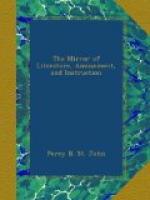“Oh! Isabel!” he said, “it is too much; my soul can bear no more. I hoped thy eyes had been spared this sight—but the cold tyrants have decreed it thus. On! leave me, leave me!—it is in vain—unmannered ruffians, spare her!” While he spoke, the soldiers forcibly tore her from him, and were dragging her through the crowd.—“My father! save him! he saved thy child!—Walter! supplicate him—he is kind.” She turned her eyes to the scaffold as she uttered these words, and beheld the form of Spenser writhing in the air, and convulsed with the last mortal agony. A fearful shriek burst from her heart, and she sank senseless in the arms of those who bore her.
Isabel survived this event more than a twelvemonth; but her reason had fled and her health was so shattered that final recovery was hopeless. She took scarcely any food, refused all intercourse with her former friends, and even with her father, and would sit silent and motionless for days together. One thing only soothed her mind, or afforded her any gratification; and this, as she was an experienced navigator of the river, her friends indulged her in—to sail from the city of Hereford to that spot on which she used to meet her lover. This she did constantly every evening; but when she landed, and had waited a short time, her shrieks and cries were pitiable. This practice one evening proved fatal. Instead of steering to the usual landing-place, a little above the city, she entered a part of the river where the current is unusually strong. The rapidity of its waves mastered and overturned the frail bark in which she sailed, and the unfortunate Isabel sunk to rise no more!
The tragic nature of these events made an impression on the popular mind which two centuries did not efface. The spirit of Isabel was still said to sail every night from Hereford to Northbrigg, to meet her lover; and the beach across the river which this unearthly traveller pursued, was long distinguished by the name of “The Spectre’s Voyage.”
Neele’s Romance of History.
* * * * *
IRISH GRANDEES.
Conspicuous amongst the most conspicuous of the stars; of the ascendant, was a lady, who took the field with an eclat, a brilliancy, and bustle, which for a time fixed the attention of all upon herself. Although a fine woman, in the strictest sense of the term, and still handsome, though not still very young, she was even more distinguished by her air of high supremacy, than by her beauty. She sat loftily in a lofty phaeton, which was emblazoned with arms, and covered with coronets; and she played with her long whip, as ladies of old managed their fans, with grace and coquetry. She was dressed in a rich habit, whose facings and epaulettes spoke her the lady of the noble colonel of some provincial corps of volunteers. A high military cap, surmounted with a plume of black feathers, well became her bright,




